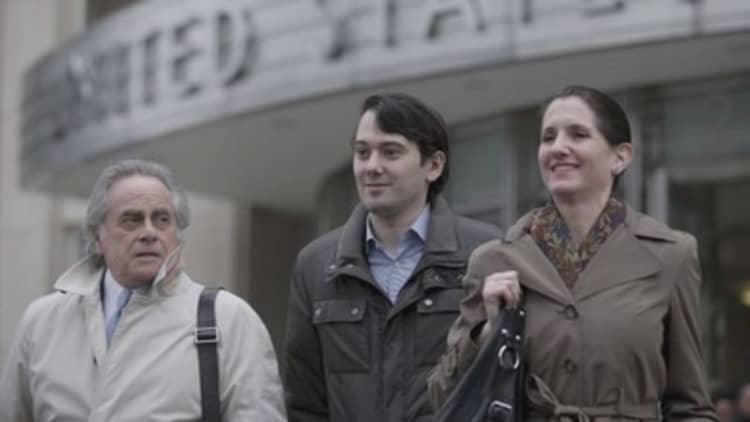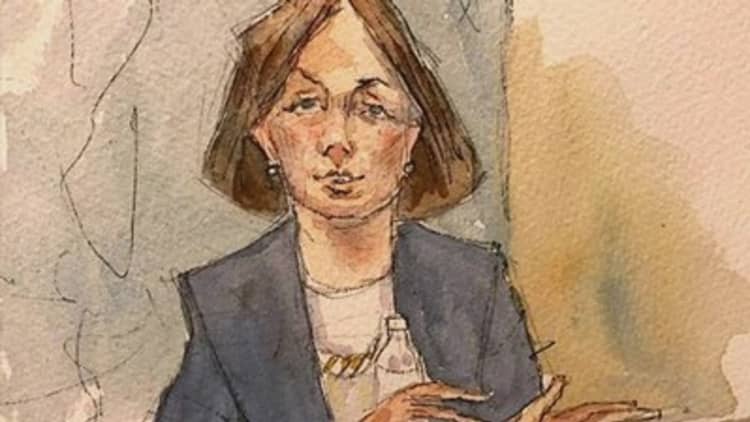A scorned Martin Shkreli "went on the warpath" after being ousted as CEO by the board of the drug company he had founded, and threatened his successor, that current chief executive testified Friday.
Shkreli said "I had never dealt with anyone like him," testified Retrophin CEO Stephen Aselage in Brooklyn, New York, federal court. Shkreli warned him, "My family and I would suffer as a result of my actions," said Aselage, as he described an October 2014 phone call with Shkreli after he was booted from the company.
"It was what I would consider a very threatening conversation," Aselage testified at Shkreli's securities fraud trial, where he also described a disturbing series of "red flags" that led to Shkreli being ousted.
He said Shkreli vowed to subject Aselage, who became chief executive after he was forced out, to "an unremitting wave of litigation."
Aselage said that afterward, "He went on the warpath, as I would describe it, to harm the company and damage the reputations of the people in the company."
Shkreli also told Retrophin investors he planned to produce a generic drug equivalent for one of Retrophin's products, which could harm company revenue, Aselage said.
"The defendant and three of his friends broke into the offices," Aselage said, and then downloaded files from Retrophin's computer servers.
Before being ousted, Aselage said, Shkreli had told Retrophin's board that he wanted a unit within the company to be allowed to operate effectively as a hedge fund trading biopharmaceutical stocks — despite concerns of the board.
"The analogy he gave us was he was a mother lion and he was training his cubs to kill," Aselage said.
Shkreli, 34, is accused of looting Retrophin of tens of thousands of shares of stock as well as cash to give to investors in two hedge funds he previously ran. Prosecutors charge that he defrauded those investors at the funds, whose financial performance was poor at the time he was issuing glowing financial statements.
Under cross examination, Aselage said of Shkreli, "Intellectually he may have the brightest intellect of anyone I've ever run into."
But Aselage went on to say, "There's also a lot of self-aggrandizing ... a lot of ego that comes out of Mr. Shkreli and some insensitivity with how he deals with other people."
"If he likes somebody, he has great people skills, or if he wants to use somebody," Aselage said.
"In day-to-day interactions with other people, he doesn't seem to see other people as important if they don't fit into the scheme of what he wants to do."
Shkreli's lawyer, Benjamin Brafman, asked Aselage why he made positive comments about Shkreli in a Retrophin press release at the same time he supposedly believed Shkreli was acting inappropriately at the company.
Aselage said, "Mr. Shkreli was doing a lot of good things."
"While he was doing some very good things, he was doing some very bad things, that were the tip of the iceberg of what we knew," Aselage said. "What he did well doesn't make him less accountable for what he didn't do well."
In his testimony, Aselage detailed a series of events that led Retrophin members to consider having Shkreli step down as CEO in 2014, and move into another role at the company that would better suit his talents.
'"The ongoing assessment was that while Martin brought a lot of good ideas to the company, he wasn't actually managing the company, and management needed to be brought to the company for it to survive," Aselage said.
"We wanted to put him in business strategy or business development, something where he could still use his interest and his intellect, but not be responsible for running the company," Aselage said.
He said Retrophin's board had learned that Shkreli had used company funds to hire private investigators to dig up information on individuals, and some board members had "significant concerns about this ongoing use of Twitter" to talk about Retrophin.
Shkreli's tweets "tended to be immature and not particularly relevant and not particularly appropriate for the CEO of a publicly traded company," Aselage said.
In one case, he said, Shkreli tweeted while the stock market was open that he was having "the best day of his life," which worried Aselage and other directors that Shkreli's followers would believe he was telegraphing nonpublic information about Retrophin stock.

Aselage also said there was a serious lack of communication between Retrophin's departments, and that he once had to speak to Shkreli about verbally berating a Retrophin employee at a board meeting.
He also said that after Retrophin's board learned that the company's business development group was using company funds to act as a hedge fund trading stocks, the board told Shkreli to stop.
"That discussion did not go well," Aselage said. Shkreli said "he would resign immediately" if he was not allowed to operate as he saw fit, Aselage said.
The board compromised with Shkreli by letting the trading continue, but imposed a cap of $50,000 on the funds that could be used for that purpose.
A former Retrophin board member, Steve Richardson, who was involved in the decision to get rid of Shkreli, said that decision came after he learned that Shkreli had ignored that cap, and offered the traders commissions for their performance.
Aselage said that when he and Richardson confronted Shkreli and said the board wanted him gone as CEO, "He said we were making a mistake."
"He told us that he would be starting a new pharmaceutical company the next day, and it would be a bigger and better company than we would have with Retrophin," Aselage testified.
After Shkreli eventually resigned, Aselage said, an investigation found that Retrophin's internal hedge fund's holdings included "a $2.5 million short position on just one stock."
Aselage said Retrophin had to restate its financial statements after Shkreli's departure because of the results of the internal investigation, which found other issues with the company's books beyond the hedge fund's holdings.
And "the company did file suit against Mr. Shkreli to recover monies lost from Mr. Shkreli's misdealings," Aselage said.
That suit seeks $65 million in damages.
Shkreli also is suing Retrophin for wrongful termination.
Both suits are on hold until after the resolution of the criminal case.
Aselage said that Retrophin had burned through so much money that at the time of Shkreli's departure, the company was on track to run out of cash within two financial quarters.
After getting spending under control, and other moves, the company now has a market capitalization of "just over $700 million," said Aselage, up from $240 million when Shkreli left.
WATCH: Co-worker says Shkreli 'mentally unstable'



